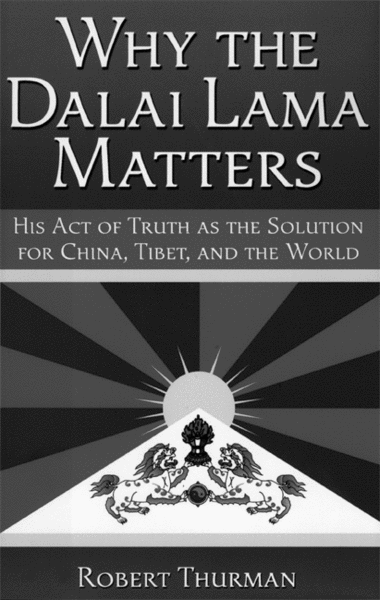Why the Dalai Lama Matters
Robert Thurman
Beyond Words, 2008, $24
In March, Chinese military police in Lhasa provided the world a glimpse of the merciless violence that has characterized China’s half-century occupation of Tibet. The recent atrocity—a massacre that resulted from a protest led by monks—was surprising because it seemed incautious of China to risk marring the prestige and good press it would garner as host of the 2008 Olympics. Amazingly, with further unconcern about international opinion, the Chinese leadership in Tibet laid blame for the riots on the exiled Dalai Lama, calling the Nobel Peace Prize recipient “a jackal in Buddhist monk’s robes.”
In his new book, Why the Dalai Lama Matters, Robert Thurman writes, “It is clear that the powers-that-be in China are hallucinating, projecting their own shadows upon his sunny persona. He is the unsolicited best friend of China and the Chinese people.” In fact, it is arguable that the Dalai Lama prevented a full-blown Tibetan uprising. The staunch pacifist even threatened to resign in the event that Chinese brutality should elicit a like response.
Instead of revolution, the Dalai Lama advocates dialogue; instead of total independence for his country, he seeks autonomy under China’s protective aegis. To Thurman’s mind, the collapse of the Soviet Union is cause for optimism; that oil-rich Kazakhstan gained independence without bloodshed justifies the logic of Tibetan forbearance, whereas Afghani rebels achieved their liberation militarily, and so—as karma would dictate—have been mired in raging conflict ever since.
Thurman explains that for most Tibetans the Dalai Lama is “the returning presence of the Buddha himself.” And Buddhism, he insists, is all about revolution, or what he terms “cool revolution,” where self-conquest is the mission of the warrior within. Accordingly, the Tibetans have not truly been conquered by the Chinese, at any rate not spiritually or personally—only politically, which is a lesser matter. Thurman writes that if the colonists withdraw, “the Tibetans will feel free, confirmed in the essential independence they always have had and always will have.” This argument explains the Dalai Lama’s ultra-conciliatory attitude, and likewise, his commitment to placing moral and psychological stakes in his country’s battle above ethnic and geographic ones.
To Thurman, he is the world’s greatest teacher, a golden age prophet, and an eco-visionary with hopes to restore Tibet’s ravaged forests and plateaus. (He jokes that he will be a naturalist in his next incarnation—and his favorite color, as it happens, is green.) With China’s economic supremacy looming, Thurman suggests the Dalai Lama might one day be enlisted as its good will ambassador, saving it from becoming an anachronistic, hyperexploitative superpower. Indeed, at times, the author’s vision of conceivable outcomes is quite roseate; he even imagines the Tibetan icon presenting a Nobel Prize to a newly enlightened Chinese President Hu.
No ordinary Tibetophile, Thurman is a prominent Buddhist scholar and influential public intellectual. He is adept at simplifying Buddhist teachings, and his forceful arguments often have an inspirational air. He has a convert’s zeal, and admits to having a notion of Buddhist superiority that his teacher does not share. Thurman nonetheless emphasizes that the Dalai Lama’s sincerely ecumenical mindset is key to his message of global ethics. And like the Dalai Lama, Thurman is eager to bring secularists into the conversation. Altruistic kindness and ethical restraint are, after all, not strictly religious ideals. As the Dalai Lama sees it, they are the scientific basis of all societies, without which there can be no hope.












